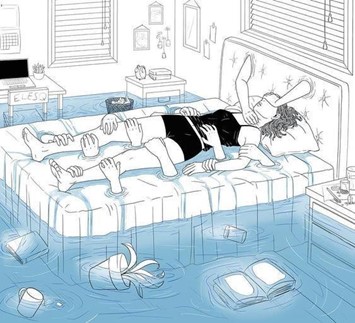Yücel Cultural Foundation formed a digital content team, and I became part of it. Each member was expected to produce at least one piece per week. I was confident that writing would allow me to meet this goal with ease. Yet days slipped by, and I never completed a single piece in full.
The more I failed to write, the more anxious I became. Drafts piled up, none of them satisfactory. I told myself, “Later I will perfect it.” But postponement turned what once brought me joy into something burdensome. At last, I decided to write about this very state—about procrastination. If I could not climb out of it, perhaps I could at least weave meaning from where I stood.
“Let today pass,” we say. “Let this week be over, then it will all settle.” In my notebook, I often write sentences that begin with “One day.” One day I will be happy, one day I will make things right. I repeated it so often that eventually I asked myself: will that day truly come? Can so many longings be contained in a single day? Is there truly such a “later”? And so my thoughts shifted into a quiet wish: may those days I begin with “one day” finally arrive.
“Procrastination is the greatest hindrance to life; for tomorrow is never certain.” — Aristotle

Others may warn us of all that procrastination steals. We read authors and philosophers on the subject. Such words may stir us, yet sometimes they deepen our gloom: “I delay, and in delaying, I let life pass me by.” Thus we both postpone and despair. The sight of others living at full speed magnifies our own stagnation. What remains for us? As wonders unfold around us, what are we doing? Such thoughts drag us downward, until we reach nowhere at all.
Why do we delay, and what is lost?
“…to defer things is the greatest waste of life; procrastination takes away each day as it arrives, promising the future while stealing the present. The greatest obstacle to life is expectation, which relies upon tomorrow and loses today.” — Seneca

Before writing this essay, I asked many people: “How would your life look if you had not delayed things?” For some, regrets rose to the surface. Others claimed they never procrastinated.
The most common replies were practical: I would have studied at a better school, pursued a finer career, been wealthier, lived a better life. Others were more tender: I would have spent more time with my mother, strengthened friendships, been happier, been a better father. One person even confessed that procrastination spared their life—they had postponed the thought of suicide. Answers varied, each unveiling a different inner struggle.
Of course, constant postponement robs us of living, yet my intent is not to command, “Cease delaying at once.” For procrastination is not mere laziness. Many causes, seen and unseen, drive us toward it. Perhaps the first step is to uncover those causes and tend to them. Perhaps it is simply rest we need, or gentleness toward ourselves. Whatever the reason, rather than rebuking ourselves—as I so often do—we must approach with patience and compassion.
It may sound a worn cliché, but we ought to begin with small things, celebrate them, and trust the process.
Why do we procrastinate?
“Depression, anxiety, procrastination—these are forms of mourning ourselves. We grieve every self that wished to be born but could not, every potential that longed to become but never did.” — Nihan Kaya

I also asked those I spoke with: why did you defer acting on the very things you now regret? Again, answers emerged: depression, anxiety, confusion, not realizing at the time. The reasons were many.
Procrastination may be an excuse for failure, yet it is itself born of countless causes. Perhaps instead of lamenting, “Why do I fail?” we ought to ask, “Why do I delay?”
This is no scientific essay, dear reader. It is simply my reflection on the causes that hold me back. After long reproach of “Why can’t I do it?”, I have chosen instead to ask, “Why do I procrastinate?” Perhaps this may be of use to you, too.
“Each morning is a birth, each evening a death. Whatever happens in between, beauty abides.” — Hermann Hesse
While youth rushes by, and while countless tasks await, let us strive for calm, turning focus gently toward ourselves. For at the heart of it all is the self. To feel heavy, to despair, to wrestle with inadequacy—these may be painful companions of youth. Yet still we live. Even when burdened by the hardest days, let us live on.
“The meaning of life is to live.” — Albert Camus
To you, dear readers, who have accompanied me to the end of this piece: I commend you for holding your attention here. May we all reach the finest versions of ourselves.
With much love,
Rosie Lou
Gülpembe Akdi
Yücel Cultural Foundation
Volunteer Writer
translated by
Ekremcan Bakır